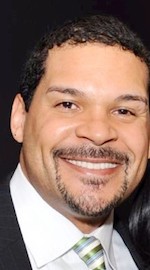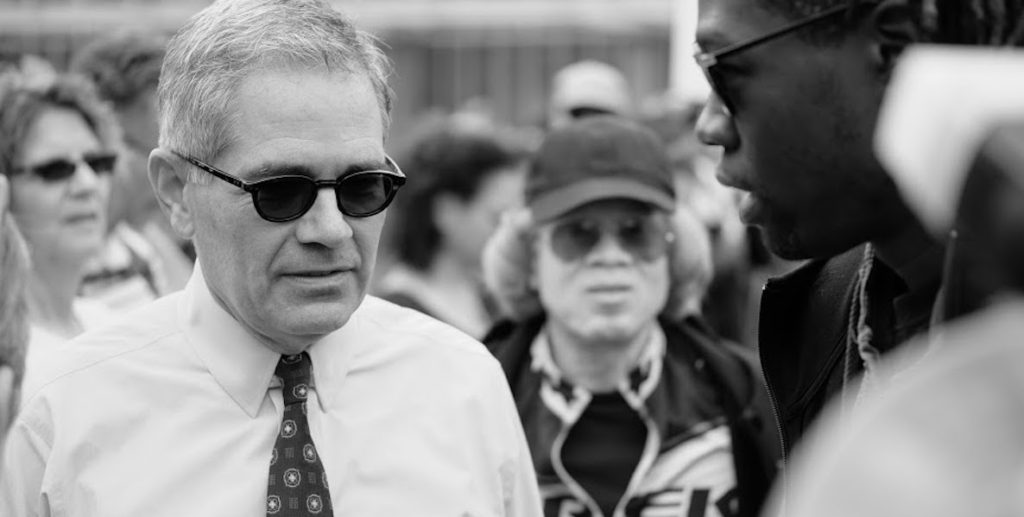Let’s first kick this off by saying that I’ve got nothing against Democratic District Attorney candidate Larry Krasner. In fact, it would be nice if Krasner won simply because, not unlike many others, the Philly D.A.’s race is emerging as something of a barometer for the general state of national competition between Democratic and Republican parties (Republican strategists are watching it closely).

It would be nice if the Krasner campaign beat the Grossman campaign’s figurative ass, just to send a message to Republicans from Harrisburg to D.C. that their behavior is unacceptable—that we have, collectively as Philadelphia and a nation, had enough.
![]()
However, let’s be realistic. Leave it to Krasner to run a cookie-cutter progressive campaign and one can see the odds are stacking up against him (with or without a last-minute infusion of loot from the George Soros PAC). Here are four reasons why Krasner and his supporters may end up throwing this away:
Are We Running for City Prosecutor or Are We Running for City Activist? It’s not clear if either Krasner or his campaign handlers have actually asked themselves the top part of that question. For sure, Krasner made an incredibly solid point during his recent sparring match with Grossman: “We’ve had a radical experiment in over-arresting, over-charging, over-prosecuting, over-convicting and over-sentencing. This system has broken people, broken families and broken employment for so many young people. It’s gotten us to a system that is neither safe, nor just.”
But that’s where he sounds more like a candidate for City Council (or maybe Mayor) than City Prosecutor.
There’s an enormous amount of risk in placing too much emphasis on reform or putting all your chips on voter conscience, as if there’s concrete evidence the broader Philly community is going through a guilt trip about the disproportionate number of black people it incarcerates. It’s evident Philadelphians know that’s a problem; but that doesn’t necessarily mean Philadelphians are ready to do what it takes to solve that problem.
Democrats, including Krasner, utterly failed during their primary to answer a key question from the bloc of city voters who pay attention to a D.A. race: How are you going to keep me, my neighborhood and my family safe?
As cynical as this sounds, the position of District Attorney is a public safety function—its sole purpose is to prosecute criminals who compromise community safety. Democrats, including Krasner, utterly failed during their primary to answer a key question from the bloc of city voters who pay attention to a DA race: How are you going to keep me, my neighborhood and my family safe? And, contrary to popular notions, it’s not just white voters asking that question. Black Philadelphia voters—at least many of the consistent, taxpaying, homeowning and mostly senior age ones that do participate in “off cycle” elections—are asking that question, too.
Elections are about winning. It’s a messaging pageant to find out which campaign can persuade the most voters to their side. Krasner seems confused on that point, convinced that a lofty mix of cerebral progressive idealism will break through an electoral mindset that’s typically drawn to the most simplistic soundbites. On that score, Grossman is killing it with a much simpler loop of, ‘I can protect you; this guy—who used to defend criminals, by the way—can’t.’ While you can fairly say “that’s not right,” it won’t matter if he doesn’t win and doesn’t have the chance to enact the kind of reform he and others feel the D.A.’s office needs.
The Electorate Krasner is Focused on the Most is The Least Likely to Turn Out. Krasner is still running his campaign like he’s in the Democratic primary. But, clearly, the primary is over and it’s time to take Grossman—the opponent he clearly underestimated—a bit more seriously. Instead of crafting a platform that offers a little bit of something for every voter bloc, Krasner keeps shifting to his left. He also makes the same soft-bigot mistake that Bernie Sanders made in the early months of his campaign: an assumption that 1) most black resident have seen the inside of a jail; and 2) criminal justice reform is all black voters care about. While Philly’s criminal justice system has, for generations, viciously targeted black residents, and while a disproportionate number of black residents do end up flowing through Philly courts and jails, the vast majority of black folks still want a better quality of life and safe neighborhood just like everyone else.
Krasner calculates significant turnout from concerned, vocal black Millennials and frustrated low-income to fixed-income residents who are justifiably tired of a government that throws them to the incarcerating wolves on the basis of skin-color. Yet, it’s unclear if Krasner understands that it’s much older black residents (from middle age to senior) who turn out the most in off-cycle elections, as well as older, home-owning middle-income black folks who want a safe block.
Black Millennials, visibly frustrated with the process, didn’t even turn out the way they should have in 2016; what changed since November? On the point of who turns out in the city, Econsult Solutions Jonathan Tannen illustrates this point vividly here: “In North Philly and South West … [t]hese wards vote disproportionately less for D.A. races than for mayoral races. For this reason, they likely have the most room for turnout growth: they have the largest number of people who do vote for mayor, but who aren’t voting for D.A.”
Obviously, we don’t have any polling data to show us which registered voters will turnout. We only have previous D.A. election cycles to point to and, for Krasner, those numbers don’t look too good.
Democrats need to stop treating voter registration like it’s a blood oath. You can register any way you want … while voting in a completely different way by the time you get to the general election.
That Philly Inquirer Endorsement of Grossman? That Was the White Voter Emergency Flare. The predictable public or talking point reflex of local and state Democratic Party operatives to the recent Inquirer endorsement of Beth Grossman was that newspaper endorsements (especially from fiscally fledgling ones) don’t really mean all that much. But, sometimes they do, particularly when voters least expect it, according to a 2011 National Bureau of Economic Research study.
If I were Krasner’s lead campaign strategist, I’d be panicking after that endorsement, especially when you consider the timing of it: so confidently more than a few weeks away from the election. The Inquirer editorial board, as unapologetically ultra Philly-white as it is, felt that certain of Grossman as the better pick that it didn’t even blink.
That racial dog whistle of an endorsement was also, in many ways, a signal to the white voter segment of the Philadelphia electorate, largely registered Democrats, possibly anxious about voting for a Republican in the age of Trump. Grossman, the endorsement basically said, is safe; the Inquirer telegraphed that party didn’t matter (even though, as we discuss above, it really does), and that “don’t worry, a safer city with fewer homicides is better …” even though enabling a political party that doesn’t care about that city can be much worse in the long term.
It also emboldened the quiet 16 percent of Philadelphia voters that voted for Trump in 2016, most of them clustered in the Northeast section of the city. That also includes many members of the Philadelphia police and fire unions (who have, not surprisingly, endorsed Grossman).
Again, in a city where homicides are up 8 percent from this same time the previous year, the public safety message reigns supreme. For some ridiculous reason, Philly Democrats and other local progressives forgot all about that.
Democrats Are Overestimating Their Registration Numbers—Again. When you start talking about Krasner’s possible electoral demise, the usual response is to not worry about that: Registered Democrats outnumber registered Republicans 7-to-1.
Democrats need to stop treating voter registration like it’s a blood oath. You can register any way you want … while voting in a completely different way by the time you get to the general election. And you can even switch up anytime you want if you’re in the mood to either disrupt or engage another party’s primary. In addition, registration doesn’t necessarily mean turnout. Just because there are over 800,000 registered Democrats in the city of Philadelphia doesn’t necessarily mean 800,000 votes turnout. As a matter of fact, only a little over 155,000 of those showed up in the Democratic D.A. primary.
The Voting Bloc Numbers Just Aren’t Adding Up for Krasner. Beyond a coalition of committed black and white progressives, Millennials—who may have voted a bit more than normal in the primary, but still aren’t competitive overall in off-cycle elections—and low-income black and Latino voters, Krasner has an uphill battle. Two crucial voting blocs in that bunch just don’t have a history of showing up the way they should, even when the office of D.A. exercises the most impact on them.
For all we know, Grossman may enjoy an electoral coalition that’s historically more apt to turn out. There’s that quiet 16 percent of Philly Trump voters that are locked in—you know: many of them are that white co-worker who giggles it up with you in the office about how the Eagles are doing then goes home to brag about how Trump is “sticking it to the blacks.”
Black Millennials, visibly frustrated with the process, didn’t even turn out the way they should have in 2016; what changed since November?
There’s also that quiet, stealth bloc of middle-class to affluent white voters who are getting jarred by city violence amid its cultural renaissance; many don’t like being a “sanctuary city” or the prospect of losing funds from D.C. and Harrisburg because of it. They are joined by a frustrated and quietly large segment of the black and brown citywide population that’s growing increasingly uneasy with the upward trend of violent crime, even while distressed by the high levels of incarceration, and the thought of lost state and federal money over a spat concerning immigrants they don’t necessarily care about.
And, last but not least, there’s the ever elusive white woman voter—especially the one with kids —who is more inclined to vote for the white female prosecutor who can offer some semblance of safety as opposed to the white guy they’re not so sure about. All these groups above pay attention to D.A. races … and they turn out.
With all that, you can see where this race may be headed—and it’s nowhere good.
Charles D. Ellison is Executive Producer and Host of “Reality Check,” which airs Monday–Thursday, 4-7 p.m. on WURD Radio (96.1FM/900AM). Check out The Citizen’s weekly segment on his show every Tuesday at 6 p.m. Ellison is also Principal of B|E Strategy, the Washington Correspondent for The Philadelphia Tribune and Contributing Politics Editor to TheRoot.com. Catch him if you can @ellisonreport on Twitter.

